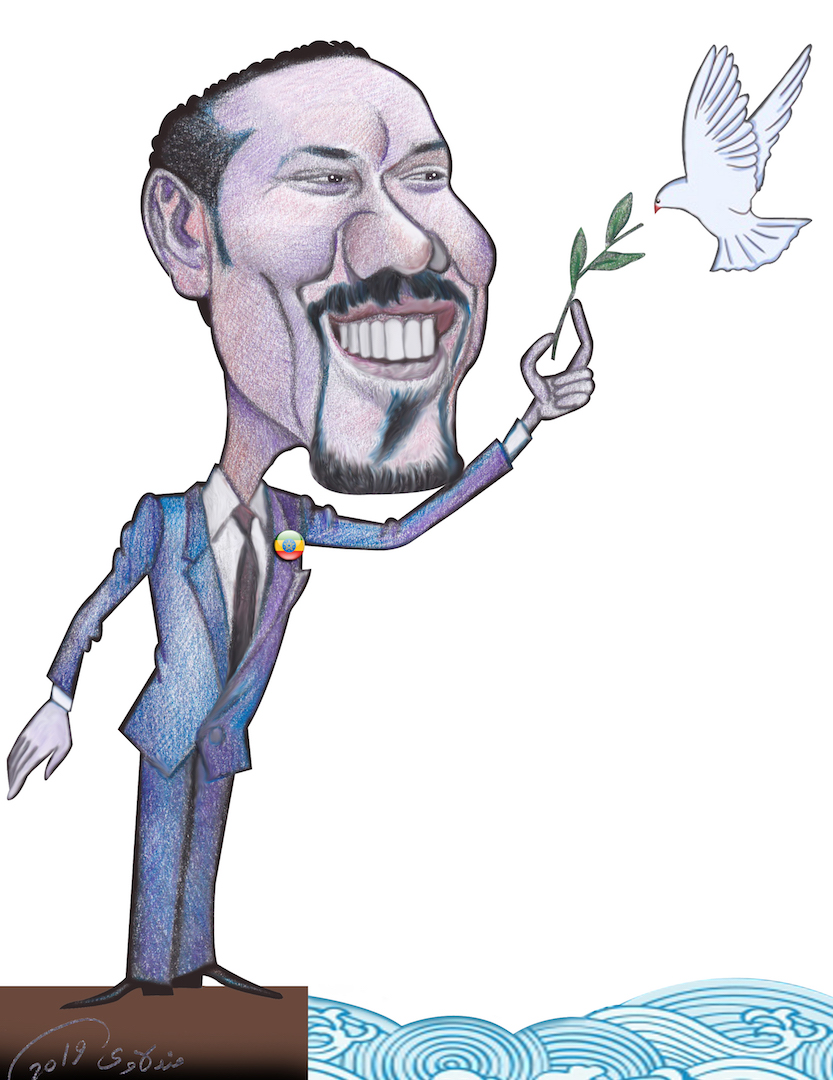
Abiy Ahmed became Ethiopia's Prime Minister in April 2018, the first Oromo to lead his country. The Oromo, Ethiopia's largest ethnic group, had never been in prominent positions of power in the East African powerhouse which has a population of more than 100 million people. Grievances over their economic and political exclusion drove nearly three years of anti-government protests across the country of which Abiy became one of the central figures of. He is most widely recognized for his success in thawing relations with Eritrea, the breakaway republic with which Ethiopia had remained on a war footing since the country gained independence in 1993. He won this year’s Nobel Peace Prize for his achievement as a peacemaker.
Abiy was born in the town of Beshasha in the historic Kaffa Province (in the present-day Jimma Zone, Oromia Region) of Ethiopia on 15 August 1976. Raised by his father, Ahmed Ali, a Muslim Oromo, and his mother, Tezeta Wolde, an Orthodox, Christian Amhara, the values of tolerance and understanding across divides were instilled in him at an early age. Abiy is the 13th child of his father and the sixth and youngest child of his mother, the fourth of his father's four wives. His childhood name was Abiyot ("Revolution"). When violent unrest broke out between the two religious communities he actively engaged in a peace forum for reconciliation.
In 1993, he joined the Ethiopian army, where he first worked in the intelligence service and rose to the rank of lieutenant colonel. After the Rwandan genocide of 1994, he was deployed as a member of the United Nations peace mission and later served in the border war between Ethiopia and Eritrea.
Abiy first moved into politics in 2010 and quickly rose within the ranks of the Oromo People’s Democratic Organisation (OPDO). He was elected to the House of Representatives, and in 2015 he became the Federal Minister of Science and Technology in Addis Ababa. Soon after, he returned to his native province of Oromia to take up the position of the Head of the OPDO Secretariats. Abiy was also given the job of leading the Oromia Urban Development and Planning Office. It was through this role that Abiy became closely associated with the issue that would eventually catapult him to the Prime Minister’s Office.
Land grabbing from Oromo’s was deemed necessary by the then federal government in order to implement the plans to create the Addis Ababa Special Zone. While initially, most Oromos remained silent, there was an undercurrent of discontent brewing. Starting from 2015, Abiy became one of the central figures in the fight against illegal land grabbing activities in Oromia Region and especially around Addis Ababa. The protests inevitably shifted towards a demand for political reform. While embroiled in trying to resolve the tensions, in 2017, Abiy received his PhD as a Doctor of Philosophy from the Institute for Peace and Security Studies at Addis Ababa University.
Following three years of unrest, on 15 February 2018, the Ethiopian Prime Minister, Hailemariam Desalegn, announced his resignation, triggering the first ever contested leadership election. On 2 April, Abiy was sworn in by the Ethiopian parliament as Prime Minister of Ethiopia. During his acceptance speech, he promised political reform; to promote the unity of Ethiopia and unity among the peoples of Ethiopia; to reach out of the Eritrean government to resolve the ongoing Eritrean-Ethiopian border conflict after the Eritrean-Ethiopian War and to also reach out to the political opposition inside and outside Ethiopia. His inaugural speech inspired hope and renewed collective sense of purpose in Ethiopia.
In the first few months after he came to power, Abiy lifted the state of emergency and ordered the release of thousands of prisoners, allowed exiled dissidents to return home and unblocked hundreds of websites and TV channels.
In June 2018, Abiy ended the 20-year state of war with Eritrea by agreeing to give up disputed border territory, in the process normalising relations with the long—time foe. The two countries signed a “Joint Declaration of Peace and Frienship” declaring an end to tensions and agreeing, amongst other matters, to re-establish diplomatic relations; reopen direct telecommunication, road, and aviation links, and facilitate Ethiopian use of the posts of Massawa and Asseb. The pace of the rapprochement and highly emotional scenes of families reuniting after decades of separation further consolidated Abiy’s success.
Since the Eritrea deal, Abiy – the youngest head of government in Africa – has also been involved in peace processes in other African countries. This has included helping to broker an agreement between Sudan’s military leaders and civilian opposition after months of protests. Abiy’s office said the Nobel Peace Prize was testimony “to the ideals of unity, cooperation and mutual coexistence that the prime minister has been consistently championing”.









